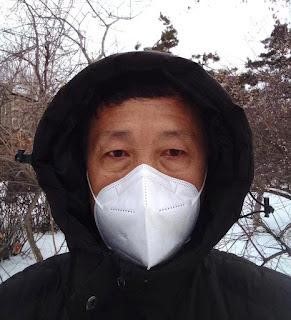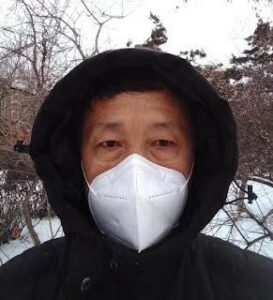(Beijing – April 2, 2024) Tang Zhengqi, the daughter of human rights lawyer Tang Jitian, passed away in Tokyo on February 20 due to pneumonia from a lung infection, at the age of 27. For two years, the Chinese authorities have refused to allow Tang Jitian to leave the country so that he can visit and care for his critically ill daughter Tang Zhengqi, who was hospitalized. Even after his daughter’s passing, they did not agree to his request to travel to Japan for her funeral. However, recently, following appeals and pressure from various parties, the local authorities in Jilin lifted the illegal restrictions on him. Tang Jitian has gained limited freedom and was able to retrieve his daughter’s ashes from a funeral home in Jilin, which were sent from Japan.
For a long time, there was no news about Tang Jitian. However, on March 20, a month after his daughter’s passing, he posted a short essay titled “A Special Spring Equinox” on his WeChat social platform. He expressed his deep longing for his daughter, writing, time flies, and the important spring equinox among the 24 solar terms has arrived. On this chilly spring day, I thought of a Japanese song ‘Springtime in the North.’ I once sang it to my daughter in Chinese while she was undergoing treatment. After singing, I told her that I was especially looking forward to the day when she could sing it to me in Japanese.
His thoughts went back to a few days ago. He continued, on the morning of March 17, around 8:40 a.m., I took the No. 3 bus to the Jingdu Cemetery Station alone and walked towards the mountain while facing the biting cold north wind that came after the snow.
Just as he reached the highway leading to the funeral home of Jilin, Yanji City, not far away, a white car followed closely behind him. The lady driving the car saw that he was struggling uphill, honked a few times to signal him, and even opened the window to ask if he needed a ride. Tang Jitian wanted to clear his mind in the wind, so he politely declined the kind offer of this good-hearted person. As he came closer to the entrance of the funeral home, the passing vehicles splashed melted snow all over the bottom of his pants, and a sense of sorrow filled his heart, leaving him with no desire to care about things happening around him.
Around 9 o’clock, he entered the funeral home’s courtyard and, after inquiring with a sanitation worker, found the building where the urn containing his daughter’s ashes was stored. Since he didn’t have the key, he had to ask the staff to pry open the door and retrieve his daughter Tang Zhenqi’s urn. There were no taxis available in the funeral home’s courtyard, so he had to walk downhill with his belongings.
He continued to write, recalling how often he used to come to this place: either for the funeral arrangements of colleagues or friends, or when he was a prosecutor supervising executions. Today, more than ten years later, when he came here again, it was to collect the ashes of my own daughter. He couldn’t help but be overwhelmed with grief and tears flowed uncontrollably! Braving the cold wind in the funeral home, carrying a heavy heart, and holding his daughter’s urn in his hand, he walked all the way to the Ping’an Village bus stop before finally taking a taxi.
At 10:10, he placed his daughter’s urn in her room where she used to listen to the story of Pinocchio, read books like “The Little Prince,” “Snow White,” “Cinderella,” and hum nursery rhymes. Overwhelmed by emotions and memories, whenever something related to her came to mind, he would talk to her as if she were right there beside him listening.
Reflecting on it, Tang Jitian felt he owed his daughter too much. Unable to calm his emotions, he said, “I will express my endless mourning by fasting for a day.”
Before practicing law, Tang Jitian was a prosecutor in China, advocating for farmers whose land was illegally seized, practitioners of Falun Gong, rights activists, and other vulnerable groups. He was unlawfully detained multiple times, had his lawyer’s license revoked, and endured kidnapping, strange car accidents, and severe mental and physical trauma.
China has a massive scale of restrictions on leaving the country, and many human rights lawyers and activists are restricted from exiting. Authorities typically use “endangering national security” as a reason to restrict citizens’ right to exit, and it is difficult to appeal these decisions.

